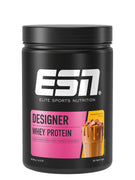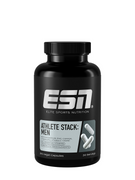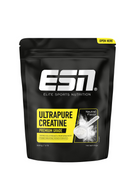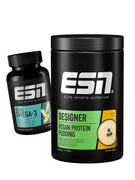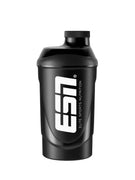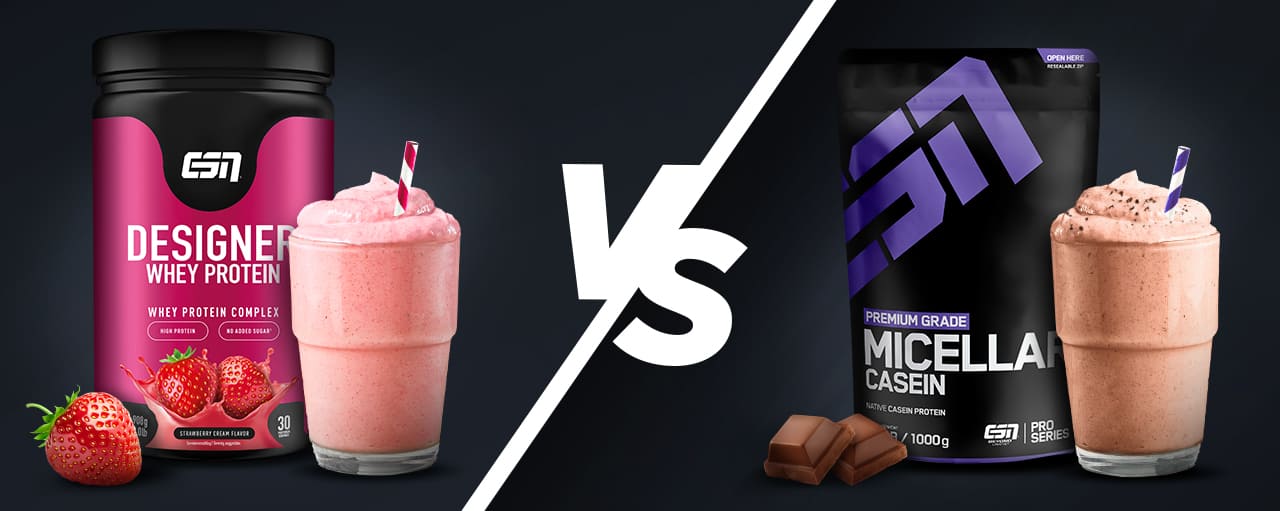Diese Vorteile bieten Casein und Whey
Die richtige Auswahl zwischen Casein und Whey ist somit nicht nur vom Proteinpulver selbst, sondern auch von dir und deinen Trainingszielen abhängig. Willst du das Protein beispielsweise auch mal zum Kochen verwenden? Oder möchtest du die Einnahme des Eiweißpulvers gezielt vor oder nach dem Training nutzen? Beide Proteinquellen supporten dich hier auf unterschiedliche Weise.
Sowohl Casein als auch Whey eignen sich für verschiedene Trainingsziele und Körpertypen. Doch zwischen der entsprechenden Wertigkeit der Eiweiße oder dem jeweiligen Aminosäureprofil gibt es einige Unterschiede. Wo diese bei Whey oder Casein liegen, was vielleicht besser zum Abnehmen oder aber zum Muskelaufbau geeignet ist, erfährst du in unserem Ratgeber.
Wo liegt der Unterschied zwischen Whey und Casein?
Sowohl bei Casein als auch bei Whey handelt es sich um Proteinquellen, die aus Milch gewonnen werden. Die Unterschiede zwischen Casein und Whey liegen allerdings in der biologischen Wertigkeit und dem Aminosäureprofil. Auch die Wirkung im Körper zeigt sich unterschiedlich: Während Whey Protein den Muskelaufbau kurzfristig fördert, verhindert Casein den langfristigen Muskelabbau.[1]
Whey wird auch als Molke bezeichnet und kommt mit einem natürlichen Anteil von 20 % in Milch vor. Das Eiweiß hat den Vorteil, vom Körper schnell aufgenommen und verwertet zu werden, was die Muskelproteinsynthese besonders effektiv ankurbelt.
Im Gegensatz zum Whey macht Casein ca. 80 % des Molkenproteins aus. Dieses Protein verfügt über eine komplexere Struktur, was ebenfalls zu den bedeutenden Unterschieden zwischen Whey und Casein gehört. Daher dauert es länger, bis das Eiweiß im Körper verdaut werden kann. Somit wird die Muskulatur über längere Zeit mit den wichtigen Nährstoffen versorgt.
Auch die biologische Wertigkeit der Proteinquellen unterscheidet sich. Beim Duell Whey vs. Casein schneidet das Whey hier grundsätzlich besser ab. Denn das Protein hat eine höhere biologische Wertigkeit als Casein. Allerdings steht diese höhere Wertigkeit nicht unbedingt dafür, dass die Proteinart die Bessere ist. Vergleicht man Casein vs. Whey so ist eher interessant, welchen Wert des PDCAAS die beiden Proteinarten aufweisen. Bei PDCAAS handelt es sich um den „Protein Digestibility Corrected Amino Acid Score”, welcher die Qualität von Proteinen definiert. Und hier weisen beide Proteinquellen den gleichen Wert auf. Außerdem können Casein und Whey mit einem vollumfänglichen Aminosäurespiegel punkten.
|
|
Biologische Wertigkeit |
Aminosäureprofil |
PDCAAS |
|
Whey Protein |
104 |
Vollständig |
1 |
|
Casein Protein |
77 |
Vollständig |
1 |
Richtige Einnahme der Proteinarten
Da Whey gegenüber Casein die notwendigen Aminosäuren schnell zur Verfügung stellt, bietet sich eine Einnahme kurz vor oder aber unmittelbar nach dem Training an. Casein versorgt dich auch in trainingsfreien Zeiten konstant – somit kannst du das Eiweiß ebenso vor dem Schlafengehen zu dir nehmen, damit es über Nacht versorgen kann. Für nachhaltige Erfolge spielt der Zeitpunkt der Einnahme von Whey oder Casein allerdings eine eher untergeordnete Rolle. Denn wenn du das Optimum für deinen Körper herausholen möchtest, solltest du die Proteinzufuhr auf deine Ernährung abstimmen: Hast du längere Zeit vor dem Training keine proteinreiche Mahlzeit zu dir genommen, ist die Einnahme vor dem Training sinnvoller. Hast du schon vor dem Training gegessen und so für eine Proteinzufuhr gesorgt, kannst du Casein oder Whey nach dem Training einnehmen.
Whey Protein: Wirkung, Wertigkeit und mehr

Whey, das auch als Molkenprotein bezeichnet wird, gilt als hochqualitative Proteinquelle. Somit wird es gerade in Form von Whey Isolat gerne von Sportlern und Bodybuildern supplementiert. Das Eiweiß weist von Natur aus einen recht geringen Laktose-Anteil auf. Auch aus diesem Grund ist das Whey Protein für viele verschiedene Sportler und ernährungsbewusste Menschen gut geeignet. Dennoch sollte ein gewisser Anteil an Laktase supplementiert werden, wenn man eine Laktoseintoleranz oder Probleme mit der Verdauung von Laktose hat.
Durch das hervorragende Profil der Aminosäuren bietet Whey Protein eine kaum vergleichbare biologische Wertigkeit. Der Wert von 104 kann von keinem anderen Proteinpulver erreicht werden. Aufgrund dieses Werts ist Whey auch gegenüber Casein besonders gut für den Muskelaufbau geeignet. Proteinpulver mit Whey gilt inzwischen als Klassiker für die Supplementierung von Eiweiß und eignet sich sowohl für Männer als auch für Frauen bestens. Bei der Auswahl deines Eiweißpulvers solltest du auf einen angemessenen Gehalt an Protein achten. Das gilt natürlich für Whey und Casein. Ein qualitatives Whey Proteinpulver sollte mindestens auf einen Anteil von 75 % Protein auf 100 g des Pulvers kommen.
Vorteile und Nachteile im Überblick
|
Vorteile |
Nachteile |
|
● Schnelle Verdauung ● Whey Protein Wirkung steht dem Körper schnell zur Verfügung ● Vollständiges Profil von Aminosäuren ● Hohe biologische Wertigkeit ● Enthält BCAAs, die von Muskeln verstoffwechselt werden können |
● Durch die schnelle Verdauung wird das Protein dem Körper auch recht schnell wieder entzogen ● Schnelle Verstoffwechselung, somit kurzfristige Proteinquelle |
Casein Protein – so arbeitet das Eiweiß im Körper

Whey vs. Casein – möchte man sich konkret entscheiden, bietet das Casein natürlich andere Vorteile als das beliebte Whey. Eine Gemeinsamkeit liegt jedoch darin, dass auch Casein aus Milch gewonnen wird. Es handelt sich allerdings nicht um ein Molkenprotein, sondern ein Milcheiweiß. Dieses Eiweiß macht den Großteil der Milch aus und befindet sich zu großen Teilen auch in Quark, Joghurt oder Käse. Im Vergleich wird die Proteinsynthese nicht so stark von Casein stimuliert, wie von Whey. Doch dies führt auf der anderen Seite dazu, dass das Protein langsamer im Körper wirkt und dich dadurch bei langfristigen Trainingszielen unterstützen kann. Ein Eiweißpulver mit Casein wird länger verdaut. Somit werden die Peptidketten, also die Verbindungen zwischen den Aminosäuren, besser für den Muskelaufbau aufgebrochen und aufgenommen. Das hat den Vorteil, dass die Muskeln deines Körpers über einen längeren Zeitraum mit dem hochwertigen Protein versorgt werden und so die Proteinsynthese möglichst lange aufrecht erhalten bleibt.[2] So hemmt Casein den Muskelabbau nach dem Training.
Vorteile und Nachteile im Überblick
|
Vorteile |
Nachteile |
|
● Recht stetige Versorgung des Körpers ● Langfristige Deckung des Proteinbedarfs ● Kann als „Nacht-Protein“ genutzt werden, da es nicht nur während dem Training die Proteinzufuhr ermöglicht ● Langanhaltend sättigend ● Hoher Calciumgehalt |
● Proteine stehen dem Körper nicht kurzfristig zur Verfügung ● Niedrige biologische Wertigkeit ● Hoher Gehalt an Laktose |
Aminosäureprofil: Whey vs. Casein Protein im Check
Beide Proteinarten haben einen gemeinsamen Vorteil: Sowohl Casein als auch Whey besitzen ein vollständiges Aminosäureprofil. Das Duell „Whey vs. Micellar Casein Protein“ ist hier aber aus einer etwas anderen Perspektive zu betrachten: Obwohl Whey und Casein über alle 8 essentiellen Aminosäuren (EAAs) verfügen, besteht ein individuelles Verhältnis.
Die enthaltenen, essentiellen Aminosäuren müssen stets über die Nahrung aufgenommen werden. Dies bietet sich besonders mit Hilfe von Proteinpulver an. Denn sowohl die Whey Protein Einnahme als auch das Aufnehmen von Casein kann durch leckere Shakes oder sogar einzigartige Rezepte geschehen. Besonders herauszustellen sind zwischen den EAA Aminosäuren vor allem die BCAAs. Hierbei handelt es sich um verzweigtkettige Aminosäuren, die unter anderem am Muskelaufbau, Stoffwechsel oder aber der Wundheilung beteiligt sind. Zu diesen Aminosäuren zählen Valin, Leucin und Isoleucin, welche alle sowohl in Casein Eiweiß als auch in Whey Protein enthalten sind. Gerade Leucin ist für viele Sportler wichtig. Denn die Aminosäure beteiligt sich stark an der Proteinsynthese. Leucin regt die Ausschüttung von Insulin an und trägt zur Regulierung des Blutzuckerspiegels bei. Darüber hinaus kann Leucin den Abbau von Glukose während des Trainings verhindern und so die Muskeln besser bei der Energieaufnahme unterstützen.[3] Die Aminosäure ist bei Whey in einer größeren Menge vertreten als bei Casein.
Essentielle Aminosäuren – Whey vs. Casein[4]:
|
Aminosäuren |
Whey |
Casein |
|
Leucin |
11,1 |
10,4 |
|
Isoleucin |
6,8 |
5,7 |
|
Valin |
6,8 |
6,8 |
|
Histidin |
2,2 |
2,9 |
|
Methionin |
2,4 |
2,8 |
|
Phenylalanin |
3,8 |
5,1 |
|
Threonin |
8,0 |
4,6 |
|
Tryptophan |
2,1 |
1,4 |
Whey oder Casein? Kombiniere dein Proteinpulver!
Warum sollte es Casein vs. Whey Protein sein, wenn es stattdessen auch einfach Casein und Whey sein könnte? Möchtest du auf eine vollumfängliche Supplementierung setzen, musst du nicht unbedingt auf eine Proteinquelle für deine Proteinzufuhr verzichten. Stattdessen kannst du von Wertigkeit und Aminosäureprofil der verschiedenen Proteinarten gleichermaßen profitieren. Am einfachsten gelingt das mit Proteinpulver, das auf Mehrkomponentenprotein setzt. Im Unterschied zu Eiweißpulver, das nur Whey oder Casein enthält, bekommt dein Körper hier beide Proteine aus der Milch und kann so den Muskelaufbau optimal unterstützen. Der Wissenschaftler Lyle McDonald wies bereits in seinem Buch „The Protein Book“ darauf hin, dass sich die Kombination von Casein und Whey vor allem auf das Verhalten des enthaltenen Leucins auswirkt. Denn während Whey das Leucin-Level in einer Stunde sehr stark ansteigen lässt – dieses sich aber schon nach 4 Stunden wieder auf einem geringeren Niveau befindet – sorgt Casein durch die langsame Verdauung für einen langsameren Leucin-Anstieg. Dafür bleibt das Leucin-Level im Blut jedoch konstant auf hohem Niveau. Somit wurde die These aufgestellt, dass eine Kombination aus Whey und Casein profitabler ist als die isolierte Aufnahme beider Proteine.[5],[6],[7]
Casein oder Whey – was ist besser zum Abnehmen?
Da Casein im Vergleich zu Whey Protein länger satt hält und den Körper über einen längeren Zeitraum mit Eiweiß versorgt, wird dieses daher häufiger und lieber zum Abnehmen genutzt. Eine Kombination von Whey und Casein kann zum Abnehmen aber auch hilfreich sein.
Bedenke folgendes: Unterziehst du deinen Körper einer Diät, wird nicht nur ungewolltes Fett, sondern auch ein Teil deiner Muskelmasse abgebaut. Weil Proteine bekanntlich zum Muskelaufbau und dem Erhalt der Muskelmasse beitragen, ist es daher sinnvoll, diese in einer angemessenen Menge über deine Ernährung aufzunehmen oder eben zu supplementieren. Da es mit der Ernährung – je nach Art der Diät – schwierig werden kann, können dir beispielsweise Proteinpulver unter die Arme greifen. Eine ausreichende Proteinzufuhr an Casein oder Whey sorgt außerdem für ein langanhaltendes Sättigungsgefühl und hat einen direkten Einfluss auf den Muskelaufbau. Whey kann, besonders am Anfang einer Diät und in Verbindung mit Sport, durch maximale Stimulation der Proteinsynthese sogar noch zu einer Zunahme der Muskelmasse beitragen.[8] Möchtest du von beidem profitieren, kannst du Whey und Casein zum Abnehmen einfach mit einem Mehrkomponenten-Eiweißpulver supplementieren.
Fazit: Whey vs. Casein – welches Protein ist besser?
Im Vergleich Casein vs. Whey gibt es keinen klaren Gewinner. Denn beide Proteinarten können deinen Körper bereichern und dich beim Muskelaufbau oder Abnehmen unterstützen. Während Casein beispielsweise den Vorteil hat, dich langfristig zu sättigen und so die Wirkung auch noch über Nacht entfalten kann, erreicht Whey schnell deine Muskeln und unterstützt dich vor allem während Trainingseinheiten.
Du kannst also sowohl mit Whey Protein abnehmen als auch mit Hilfe von Casein Muskelaufbau betreiben. Der Unterschied, ob Whey oder Casein am besten geeignet ist, liegt eher darin, welches Trainingsziel du verfolgst. Im Zweifelsfall muss es gar nicht „Whey vs. Casein – was ist besser?“ lauten, sondern du kannst durchaus auch Casein und Whey Protein gemeinsam nutzen.
Kombiniert schaffen die Proteinquellen eine ideale Grundlage, um deine Muskulatur und so deinen gesamten Körper optimal zu unterstützen. Wieso also nur von begrenzten Vorteilen profitieren, wenn du alle haben kannst? Setze doch einfach auf ein hochwertiges Proteinpulver, das die besten Eigenschaften miteinander vereint.
Quellen
- https://pubmed.ncbi.nlm.nih.gov/23343671/
- Hoffmann, JR. / Falvo, MJ. (2004): Protein – Which Is Best? J Sports Sci Med: 3: 118-130. URL: https://www.jssm.org/vol3/n3/2/v3n3-2pdf.pdf.
- https://www.metabolismjournal.com/article/S0026-0495(08)00312-0/fulltext
- https://www.milag.net/aminosaeuren-in-milch#m
- https://pubmed.ncbi.nlm.nih.gov/17093159/
- https://pubmed.ncbi.nlm.nih.gov/22569072/
- https://pubmed.ncbi.nlm.nih.gov/23343671/
- https://pubmed.ncbi.nlm.nih.gov/16679981/
